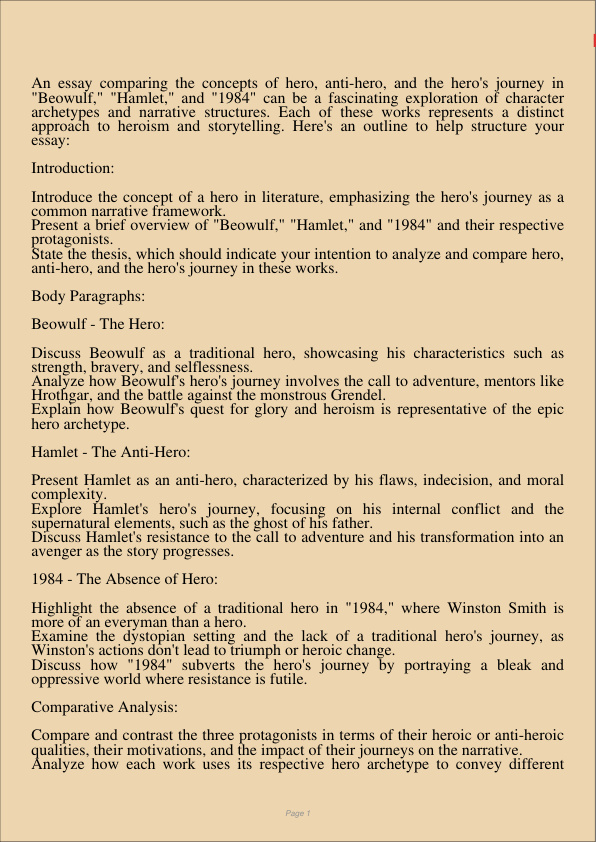Hero AntiHero And A HeroS Journey In Beowulf Hamlet And 1984
Jan 9, 2024
journey
hero
Management
Information Technology

An essay comparing the concepts of hero, anti-hero, and the hero’s journey in “Beowulf,” “Hamlet,” and “1984” can be a fascinating exploration of character archetypes and narrative structures. Each of these works represents a distinct approach to heroism and storytelling. Here’s an outline to help structure your essay:
Introduction:
Introduce the concept of a hero in literature, emphasizing the hero’s journey as a common narrative framework. Present a brief overview of “Beowulf,” “Hamlet,” and “1984” and their respective protagonists. State the thesis, which should indicate your intention to analyze and compare hero, anti-hero, and the hero’s journey in these works.
Body Paragraphs:
Beowulf - The Hero:
Discuss Beowulf as a traditional hero, showcasing his characteristics such as strength, bravery, and selflessness. Analyze how Beowulf’s hero’s journey involves the call to adventure, mentors like Hrothgar, and the battle against the monstrous Grendel. Explain how Beowulf’s quest for glory and heroism is representative of the epic hero archetype.
Hamlet - The Anti-Hero:
Present Hamlet as an anti-hero, characterized by his flaws, indecision, and moral complexity. Explore Hamlet’s hero’s journey, focusing on his internal conflict and the supernatural elements, such as the ghost of his father. Discuss Hamlet’s resistance to the call to adventure and his transformation into an avenger as the story progresses.
1984 - The Absence of Hero:
Highlight the absence of a traditional hero in “1984,” where Winston Smith is more of an everyman than a hero. Examine the dystopian setting and the lack of a traditional hero’s journey, as Winston’s actions don’t lead to triumph or heroic change. Discuss how “1984” subverts the hero’s journey by portraying a bleak and oppressive world where resistance is futile.
Comparative Analysis:
Compare and contrast the three protagonists in terms of their heroic or anti-heroic qualities, their motivations, and the impact of their journeys on the narrative. Analyze how each work uses its respective hero archetype to convey different themes and messages. For example, “Beowulf” might emphasize heroism and honor, “Hamlet” explores the complexities of revenge and morality, and “1984” illustrates the consequences of totalitarianism.
Conclusion:
Summarize the main points discussed in the essay regarding hero, anti-hero, and the hero’s journey in “Beowulf,” “Hamlet,” and “1984.” Reflect on how these character archetypes and narrative structures serve the themes and purposes of each work. Offer final thoughts on the significance of these archetypes in literature and how they continue to resonate with readers across different time periods and genres.
In your essay, make sure to provide specific examples and textual evidence from each work to support your analysis. Consider the cultural and historical context of each text and how it might influence the portrayal of heroism and the hero’s journey.